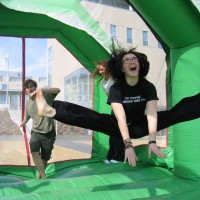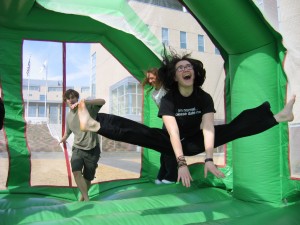
Being able to recover from a bad performance is an important skill to develop at any level within agility. From novice to world team member, being able to put a previous poor outing (e.g., run, day, weekend) behind you and get in the right frame of mind for your next attempt are imperative for your self-confidence and enjoyment.
While many people believe that you’re either born with that rebound skill or not, it simply isn’t the case. Resiliency can be developed and cultivated. Thinking about, and working on, how you practice and train will give you the opportunities to build rebound strength before you put it to the test in competition. Here are a couple of ideas you’ll want to try at your next training session.
Idea 1 – Fail in Practice
Failing in practice is one way we learn to cope with failure in competition. While failing all the time in practice isn’t good for our self-confidence and skill development, it’s important to experience it on a regular basis as long as it’s done properly. That is, in training, we continue to push beyond our current skill set into new territory where we will fail, but over time and practice, we add to our capabilities and continue to push the boundaries of what we can achieve.
With the young hockey players I coach, I always tell them, “If you haven’t fallen down today, then you’re not pushing yourself hard enough.” The same applies to agility handlers. Having an easy practice may help your self-confidence over the short-term, but it does nothing to prepare yourself for experiencing failure in competition and definitely doesn’t help your skills develop.
Athletes who are successful at bouncing back from poor performances don’t see failures as a negative. To these athletes, unsuccessful attempts are viewed as learning opportunities. Chances to grow within their sport and develop their skills beyond what they have already achieved.
By setting up your training sessions with challenges that will push your limits, you will learn to identify weaknesses in your skills set, develop a training plan to overcome those weaknesses, and ultimately see failure as part of learning and playing your sport.
It’s this recognition that failure is inherent in agility and that you will overcome it that allows you to move forward with energy, excitement, and motivation to the next run.
Idea 2 – Visualize the Rebound
Visualization is a powerful tool that has so many uses (If you don’t already have a visualization training program on the go, I would start one up immediately). For the purpose of developing your rebound ability, create an imagery script (like a movie script with lines, settings, etc.) that begins after a bad run and extends to through your next run which will be executed as a peak performance.
Include your thoughts, feelings, and behaviours you experience after a poor performance. See yourself confidently parking your negative emotions and clearing your mind for your next run. Visualize you and your dog preparing with positivity and certainty of purpose. Finally, watch as you and your partner execute your plan and experience a peak performance.
Rehearse this visualization on a regular basis. As you continue to develop your skills, remember to update your imagery script to reflect those changes.
Those are just a couple of ideas to get you started. If you’ve tried some things to help you rebound from bad performance share them in the comments. It’s great to hear from fellow competitors.
Sincerely;
John

Leave A Reply (3 comments so far)
The comments are closed.
Christine Schragel
12 years ago
Hi,
thanks for your ideas. What helped me first is Susan Garretts posts on challanges and when I fail, it helps me to reread such things and remind me that all stars fail, they only recover and try again faster than I.
I also like the exersise from Anthony Robbins book NLP to visualise the picture I fear and make it smaler and smaler.
Training plans do help and the possibility to go back to them and may be redefine them.
AND simply a deep exhale. (Debbie Potts)
Christine
Bonnie
12 years ago
I have played alot of different sports in my life and drawing on past experience works well for me….I know the feeling of just barely making it into the A side of a tournament, after the round robin, to go on and win it all. I had these very thoughts this past regionals I needed 212 points on Sunday to qualify after a bad showing on Saturday . On my long drive to the agility site Sunday morning I thought of the times the teams I had played on had done poorly on the Saturday and then came from behind to win it all…I certainly didn’t win it all but my dog and I scored 237 points on Sunday to qualify…..now this gives me an agility come back to draw on when I have a bad day or trial.
debbyq
12 years ago
WOW … this is great … i am consistently talking to students about mental toughness and why it is so important when showing dogs …
i have send many to your website and will continue to do so …
thanks so much ….